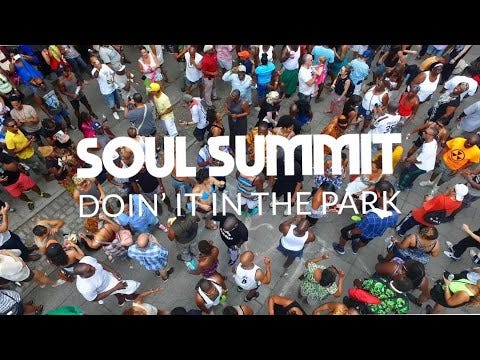Sunday Music_Brooklyn Soul Summit
The short doc 'Doin' It In the Park' is a love-letter to the Ft. Greene institution on the cusp of its 20th anniversary, and a reminder of what city's have and can't afford to lose
I don’t know where and when the tradition of the New York disco/house park jam was born — in The Bronx near the time of hip-hop’s birth, maybe? feels like even earlier than that — but I do know the first one I “attended” had to be as a gawker of rollerskaters near Central Park’s Naumburg Bandshell. That gathering remains one of New York dance-music community’s best, most public secrets, symbolizing something that many beancounters who run the city don’t understand: the magnetism and importance of its community culture. It’s been notable that as the pandemic moved through phases locally, the musicality and vibrancy of the city’s parks only became more pronounced. The rollerskaters (and big Patrice Rushen sounds) were out in full force when #GrowingUpOrlov and I wandered by the Bandshell in late September. It was one of a handful of pick-up musical attractions we encountered in the park, all of which felt like lifelines to citizens for whom gathering together to share in sonic, rhythmic sacrament is a main reason why New York remains great.
Other park-jam institutions never made it out last summer. The house music park jam nearest and dearest to my heart, Ft. Greene’s Soul Summit, was among them. Though as you’ll see if you watch the lovely 10-minute documentary about Soul Summit directed by Tayo Giwa (and produced by the folks at the indispensable Black Owned Brooklyn) it ain’t all because of Covid. The hellhound on the party’s heels is gentrification, a common nemesis of community culture, especially when fostered by Black and Brown folks in neighborhoods they’ve long called home, which white people have been flocking into (and of which Ft. Greene has been “Exhibit A” for at least a decade).
Launched by the DJs Sadiq, Tabu and Jeff Mendoza in 2001, Soul Summit is one of the city’s natural descendants of Paradise Garage and The Loft’s serious-dancer selections (and mixed but Black-/Brown-centered crowds), and of Brooklyn’s incredible summer block party energy. Tabu once told me that the party’s first neighborhood “rabbi” was no less than Laetitia James (then-local councilperson, now New York State Attorney General), who helped Soul Summit get permitted up and relocate from its initial small-park space (Cuyler Gore on Fulton) to the expansive Ft. Greene Park. By the early ‘10s, Soul Summit was a staple of the city’s great house music events — a monthly summertime Sunday meeting place, church for the initiated, the best kind of weekend-ender for Saturday night ravers. But as Giwa’s film makes clear, it was also increasingly under attack from its new neighbors. For them, social values and property values did not mix.
In the film, critic and educator Kavita Kulkarni makes numerous salient points about the importance of Soul Summit (and events like it) to the strength of a community. You can also understand how her points apply more broadly, to what it means to live in a modern-era city — the good and the bad. Whatever happens in the time following Covid, those points will become even more important to consider. New York’s beancounters, their budget minions and the civic forces they control, need to understand that it won’t be real estate that will help the city remain great. It’s Soul Summit, park jams like it, and whatever crazy public performance and expression of communal joy the next generation of city kids come up with.


